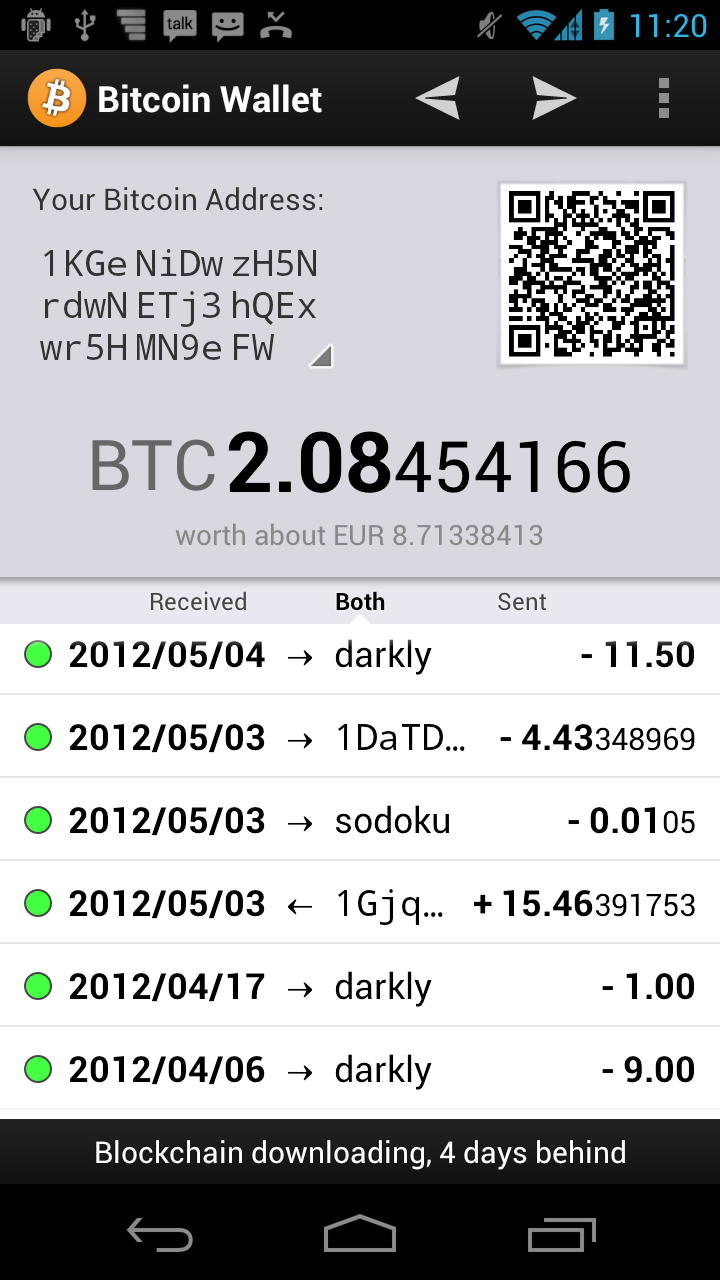Wallet: Difference between revisions
Undo removal of Bitcoin Wallet. |
m fix links |
||
| Line 21: | Line 21: | ||
The wallet.dat file is located in the [[data directory|Bitcoin data directory]] and may be [[Wallet_encryption|encrypted with a password]]. | The wallet.dat file is located in the [[data directory|Bitcoin data directory]] and may be [[Wallet_encryption|encrypted with a password]]. | ||
It is intended that a wallet file be used on only one installation of Bitcoin at a time. Attempting to clone a wallet file for use on multiple computers will result in "weird behavior"<ref>[http:// | It is intended that a wallet file be used on only one installation of Bitcoin at a time. Attempting to clone a wallet file for use on multiple computers will result in "weird behavior"<ref>[http://bitcointalk.org/index.php?topic=5324.msg77896#msg77896 Multiple instance of bitcoin with the same wallet]</ref>. | ||
The format of this file is Berkeley DB. Tools that can manipulate wallet files include [[pywallet]]. | The format of this file is Berkeley DB. Tools that can manipulate wallet files include [[pywallet]]. | ||
Revision as of 02:06, 10 June 2019
A Bitcoin wallet is a collection of private keys but may also refer to client software used to manage those keys and to make transactions on the Bitcoin network.
This page covers various wallet formats in use.
Bitcoin Core
The original Bitcoin client stores private key information in a file named wallet.dat following the so called "bitkeys" format.
It contains:
- keypairs for each of your addresses
- transactions done from/to your addresses
- user preferences
- default key
- reserve keys
- accounts
- a version number
- Key pool
- Since 0.3.21: information about the current best chain, to be able to rescan automatically when restoring from a backup.
The wallet.dat file is located in the Bitcoin data directory and may be encrypted with a password.
It is intended that a wallet file be used on only one installation of Bitcoin at a time. Attempting to clone a wallet file for use on multiple computers will result in "weird behavior"[1].
The format of this file is Berkeley DB. Tools that can manipulate wallet files include pywallet.
Armory
The Armory client uses a custom Deterministic wallet format described here and runs on top of Bitcoin Core.
Bitcoin Wallet
 Bitcoin Wallet uses the bitcoinj protobuf format for its wallet file. However, due to Android isolation of applications, it is impossible to access the wallet file as a non-root user.
Bitcoin Wallet uses the bitcoinj protobuf format for its wallet file. However, due to Android isolation of applications, it is impossible to access the wallet file as a non-root user.
Blockchain.info
Blockchain.info offers a hybrid eWallet called "My Wallet". It use a plain text JSON wallet format. Private keys Keys are stored in base58.
Denarium.com
Denarium is Physical Bitcoin coin manufacturer. Denarium produces easy, handy and secure wallets in a coin form. The private key is stored under a security seal without password protection. Denarium also offers a trustless multisignature coins, which eliminates the need to trust the manufacturer.
Ledger Wallet
Ledger Wallet manufactures various hardware wallets.
Multibit
Multibit HD (the current version) uses a BIP 0032 (type 2) Deterministic wallet with the format described here. The "Classic" version used the bitcoinj protobuf wallet file.
Blocktrail
Blocktrail offers a BIP 0032 (type 2) Deterministic wallet and for added security also implements Multisignature wallet technology.
TREZOR
TREZOR is an isolated hardware environment for offline transaction signing and using a small display you can visually verify the transaction contents.
Opendime
Opendime is a small USB stick that allows you to spend Bitcoin like a dollar bill. Pass it along multiple times. Connect to any USB to check balance. Unseal anytime to spend online. Trust no one.